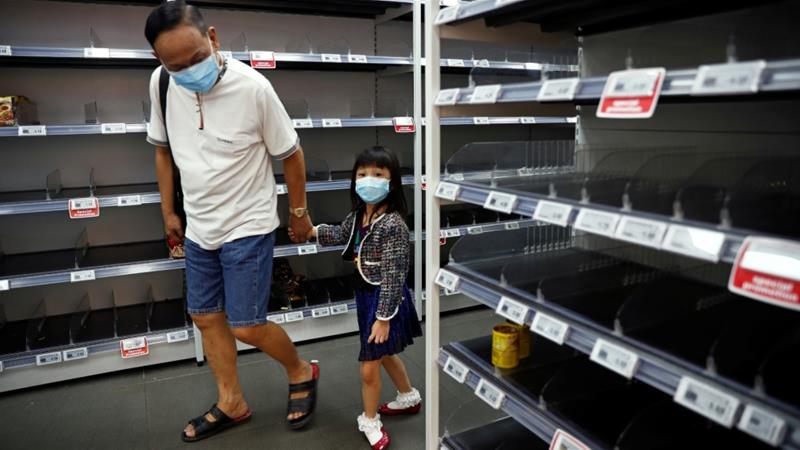Singapore cut its 2020 growth and exports forecasts on Monday due to the expected economic blow from the new coronavirus outbreak, flagging the chance of a recession this year.
A growing number of Asian Pacific economies are lowering their economic growth forecasts as the virus spreads, with Thailand and New Zealand also cutting their full-year estimates on Monday.
Singapore's Prime Minister Lee Hsien Loong said on Friday that a recession was possible, with the government downgrading its gross domestic product (GDP) forecast to as low as a 0.5 percent contraction, compared with a range of between 0.5 percent to 2.5 percent growth previously.
"The outlook for the Singapore economy has weakened since the last review ... In particular, the COVID-19 outbreak is expected to affect the Singapore economy," said Singapore's Permanent Secretary of the Ministry of Trade and Industry, Gabriel Lim, referring to the disease's technical name.
The Southeast Asian city-state has reported 75 cases of the virus to date, one of the highest tallies outside China where more than 1,700 have died because of the virus.
Lim said the effects would be most keenly felt in manufacturing, trade, tourism and transport, alongside retail and food services.
Singapore is set to roll out a hefty package of measures to cushion the blow from the epidemic on its economy in its annual budget on Tuesday with some analysts expecting it to plan for its biggest deficit in more than 10 years.
The full-year forecast for non-oil domestic exports was also lowered on Monday from a potential shrinkage of 0.5 percent to growth of 1.5 percent. That compared with its previous estimate of 0 to 2 percent growth.
The city-state slightly revised up its 2019 fourth-quarter growth figures.
GDP expanded by 1 percent year-on-year in the fourth quarter, faster than the 0.8 percent growth in the government's advance estimate, while it grew 0.6 percent on the quarter, compared with an initial estimate of a 0.1 percent.
The economy had been staging a nascent recovery after recording its lowest growth rate in 10 years in 2019 at 0.7 percent before the virus spread to the city-state in late January.
"This would be the last good number we will see at least for the next two quarters," said Lee Ju Ye, an economist at Maybank.
"We are mindful that there is a risk of a technical recession," Lee said, adding that such a contraction may prompt central bank easing. Economists define a recession as two consecutive quarters of shrinkage in GDP.
The Monetary Authority of Singapore (MAS) is scheduled to issue its semi-annual policy review in April. MAS' Deputy Managing Director of the Economic Policy Group Edward Robinson said on Monday that its monetary policy position and inflation forecasts remain unchanged.
In Thailand, which is dependent on tourism and trade, growth for the full year was lowered to a range of 1.5 percent to 2.5 percent in 2020, down from a previous estimate of 2.7 percent to 3.7 percent, the National Economic and Social Development Council said on Monday.
This came as growth in GDP sank to 2.4 percent in 2019, its slowest pace in five years, with a decline in exports and slump in public spending led to a 1.6 percent growth in the October-December quarter.
Analysts had forecasted a 2.1 percent growth for the quarter in a Reuters news agency poll.
On a quarterly basis, the economy grew 0.2 percent in the October-December quarter, the National Economic and Social Development Council said, less than the forecast 0.4 percent growth.
Meanwhile, New Zealand Prime Minister Jacinda Ardern said her country's GDP is expected to slow to around 2 percent to 2.5 percent this year, due to the economic effect of the coronavirus epidemic.
Ardern said the forecasts were from the treasury which had previously predicted a GDP growth of 2.2 percent to 2.8 percent. She said the repercussions will be seen in the first two quarters of the year.
"Treasury expect things to return to normal in the second half of 2020," she told a news conference on Monday.
Although New Zealand has not recorded any cases of the coronavirus, its tourism industry is highly dependent on the inflow of Chinese travellers.
SOURCE: Reuters news agency



